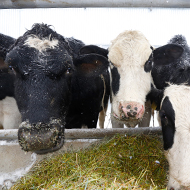Animal abuse footage 'inexcusable', say cattle vets

"Farming is an industry that relies on the trust of consumers" - Elizabeth Barry, BCVA president.
The British Cattle Veterinary Association (BCVA) has responded to a BBC Panorama documentary featuring incidents of animal abuse.
In a statement, the organisation said the events featured in the undercover footage fail to meet the legal frameworks designed to protect livestock and are ‘inexcusable’, adding that ‘where such abuse occurs, it should be reported to the relevant authorities immediately.
Elizabeth Berry, BCVA president, commented: “Farming is an industry that relies on the trust of consumers and all of us involved with this community understand that even whilst working in a challenging environment with increasingly smaller margins, welfare remains a priority for most British dairy farmers. The scenes of abuse we saw on Panorama are an intolerable exception.”
The documentary, entitled ‘A Cow’s Life; The True Cost of Milk?’, explored whether animal welfare is being compromised in a bid to drive down milk prices. During the show, the issue of calf separation, downer cows and lameness were all touched on, giving viewers a glimpse into some of the least understood aspects of dairy farming.
In one scene, a recumbent cow is moved using a hip hoist. In its response, the BCVA said: ‘Hip hoists can be a useful tool to help lift downer cows to prevent them from pressure-related injury. However, this is intended to lift the cow, rather than to move it, and should be used under the supervision of someone experienced in operating this equipment correctly.
‘The cow must be free from injury, lifted over a soft surface where possible, and the hoist should be removed only once the cow is fully weight-bearing or when it is clearly offering no further benefit. Where a downer cow is responsive, alert, eating and drinking, then attempting to rise them is advisable and full recovery is often possible.’
The Association added that it is working on a new guidance document for its members and their clients.
Ms Barry said: “We need to recognise the importance of teamwork when it comes to meeting and raising welfare standards in UK dairy farming. Collaboration and education will be key if want to earn and retain a reputation of trust with UK consumers, and we need to take care of those who produce our food too – with educational and mental health support.
“Whilst abuse at any level can’t be tolerated, we equally need to celebrate and support those who dedicate their lives striving for better welfare and higher health standards on farm.”



 The Federation of Independent Veterinary Practices (FIVP) has announced a third season of its podcast, Practice Matters.
The Federation of Independent Veterinary Practices (FIVP) has announced a third season of its podcast, Practice Matters.